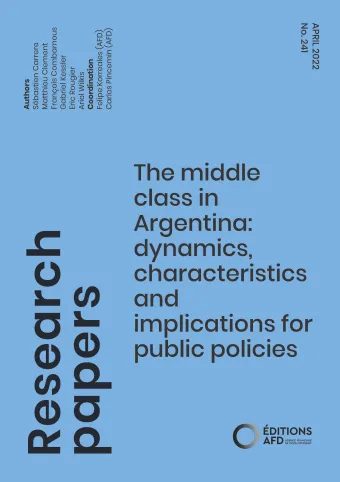Share the page
The middle class in Argentina: dynamics, characteristics and implications for public policies
Published on

Argentina is generally considered as the typical middle-class country in Latin America. Yet, while the successive crises that have hit the Argentinean economy over the four last decades have obviously affected both the size and stability of its middle class, academic studies are lacking on the consequences of these crises on socio-economic stratification and on middle-class preferences and expectations. The present paper fills this gap by focusing on the most recent period. To do so, we adopt an original research design based on a combination of quantitative investigations, based on existing household surveys and original qualitative materials, that aims to: (1) identify the Argentinean middle class and its structure, as well as describing its dynamics; (2) examine the group’s behavior and subjective perceptions, as well as their expectations in terms of public policies; and (3) assess to what extent the design of public policies and private market strategies is impacted by the composition and dynamics of the Argentinean middle class. First, our analysis shows that the trend of upward mobility that was dominant until 2007 and led to the expansion of a new Argentinean (lower) middle class progressively slowed down and even reversed after 2014. Second, the implementation of a cluster analysis led us to identify five distinct groups within the Argentinean middle-income class, thus confirming its heterogeneity. Third, the qualitative survey conducted on 40 individuals from middle-class households in Buenos Aires and Tucuman provides detailed accounts of the subjective perceptions and expectations of the different segments of the Argentinean middle class. Fourth, our analysis confirms that the Argentinean middle class is heterogeneous in terms of political orientations. Lastly, a qualitative institutional survey conducted among 12 representatives of public and private institutions points out the recent implementation of public or private programs specifically dedicated to households from the middle class.
Useful Information
-
Authors
-
Sébastien CARRERE, Matthieu CLEMENT, François COMBARNOUS, Gabriel KESSLER, Eric ROUGIER, Ariel WILKIS
-
Coordinators
-
Felipe KORREALES
-
Edition
-
241
-
Number of pages
-
69
-
ISSN
-
2492 - 2846
-
Collection
-
Research Papers
